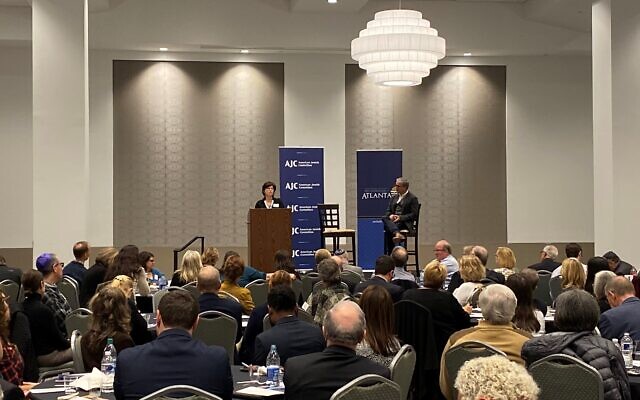The Narrow Bridge to Interfaith Understanding
A Nov. 7 interfaith program at Temple Sinai marked the 54th anniversary of the "Nostra aetate," the groundbreaking papal decree on the church's relations with other religions.
Dave Schechter is a veteran journalist whose career includes writing and producing reports from Israel and elsewhere in the Middle East.

The Latin phrase “Nostra aetate” translates to “in our time.”
It was “in our time” on Oct. 28, 1965, when Pope Paul VI issued a 1,600-word document entitled “Declaration of the Relation of the Church with Non-Christian Religions.”
In that ground-breaking statement, the Catholic Church acknowledged that truths could be found in other religions, that the Jewish people no longer were to be blamed for the death of Christ, and that anti-Semitism had no support based on church doctrine.
“My students at Marist [School] wonder sometimes why we have to study history,” Brendan Murphy told a Nov. 7 program at Temple Sinai, presented by the American Jewish Committee and the Roman Catholic Archdiocese of Atlanta to mark the 54th anniversary of that papal decree. “We are here to confront the past in a very meaningful way. We are here to remember . . . There is no future without memory.”
Murphy is acclaimed for his teaching of Holocaust history at Marist, a private Catholic high school. His “Bearing Witness” seminars have incorporated trips to the sites of Nazi concentration camps in Europe and to the United States Holocaust Memorial Museum in Washington, D.C.
Yet he came to a critical aspect of the subject years into his education. “Not once did a teacher or a professor ever talk about the long and tragic history of Christian anti-Semitism. Not once were the words ‘Nostra aetate’ spoken in a classroom of mine,” said Murphy, who grew up attending Catholic schools, went on to major in history at the University of Notre Dame and earn his master’s degree from Spring Hill College.
Marist is a partner in the “Peace by Piece” program, bringing its students together with those from the Jewish trans-denominational The Weber School and the Islamic W.D. Mohammed School.
The day after the Oct. 27, 2018, massacre of 11 Shabbat morning worshippers at the Tree of Life synagogue in Pittsburgh, Marist students, faculty and staff were encouraged to write letters to The Weber School. The next day, Murphy delivered more than 700 such “affirmations of a rejection of anti-Semitism” to Weber. “I felt like I was delivering our own ‘Nostra Aetate.’ This was our time,” he said.
Speaking after Murphy, Rabbi Ellen Nemhauser offered the words of a well-known Jewish song in discussing interfaith work. “All the world is a very narrow bridge and the main thing is to have no fear at all,” she said, quoting words attributed to Hasidic Rabbi Nachman of Breslov.
Interfaith work is based on building bridges between communities, Nemhauser said. “Interfaith connections require us to be vulnerable, to sometimes encounter very uncomfortable feelings. We are each commanded in our faith to do world repair.”
Nemhauser has devoted many years to such efforts. She serves on the executive board of Faith Alliance of Metro Atlanta, has been a leader of World Pilgrims trips, and serves on the executive committee of the Jewish Community Relations Council. Interfaith work, she told the audience, requires “being fearless, getting a little messy, stepping out of our comfort zone” and recognizing that “We need to be a little uncertain. Our truth can’t be the only truth. Our way is just not the only correct way.”
To that end, a portion of the evening last week was set aside for conversations at the tables occupied by the 250 or so people in attendance, not only Jews and Catholics, but also members of other faith traditions.
While more than a half-century has elapsed since “Nostra Aetate,” Israeli Consul General Anat Sultan-Dadon, who began her post in Atlanta several months ago, noted that slightly more than 25 years have passed since Israel established diplomatic relations with the Holy See, the formal name of the government of the Catholic Church, based in Vatican City, an independent enclave within Rome.



comments